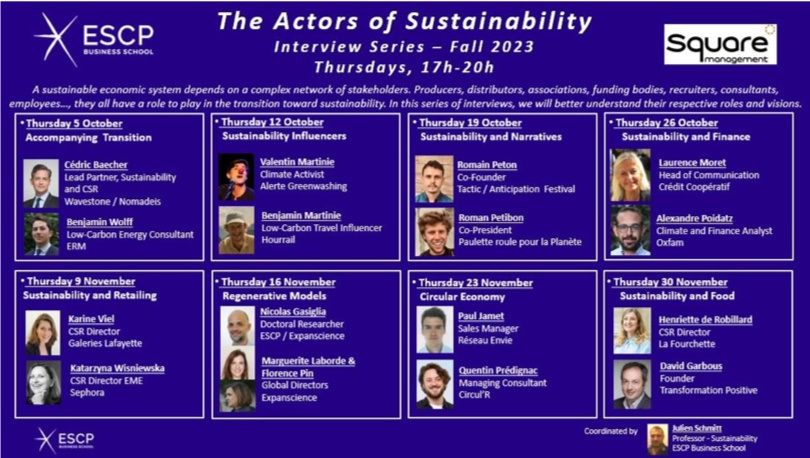RESEARCH for Impact Joining the forces of academic research and consulting to shape the future of sustainable business
To answer the urgent ecological and societal imperative to rethink business practices, ESCP Business School and Square Management have built a research partnership focusing on the transformation of marketing practices to answer sustainability challenges.
In the face of the rising challenges related to climate change and ecosystem collapse, it has become necessary to rethink the practices of various economic actors in order to reduce their ecological and social impact. In this context, the marketing function within businesses has an important potential influence. In charge of the development, delivery, and communication of firms’ offers, marketing can influence product development towards higher levels of circularity and eco-conception as well as consumer demand toward more sustainable purchases. This underscores the necessity for marketing to reinvent itself.
There is a growing number of students eager to work on sustainability topics. Therefore, ESCP has developed numerous teaching and research activities on these themes.
- Julien Schmitt
To contribute to this reflection, ESCP Business School and Square Management have decided to join forces and develop a research collaboration on the complex issue of transforming marketing practices. To gain insight into this new partnership, we interviewed Julien Schmitt, associate professor of sustainability and marketing at ESCP’s Paris campus, and David Alcaud, partner in charge of the Square Management Research Centre.
In parallel, Square Management is highly involved in applied research with the Square Research Centre, and we are developing an expertise in Sustainable Marketing in order to provide our clients with concrete solutions to face these new business challenges.
- David Alcaud
A Synergy of Interest in Sustainability
ESCP is accelerating the development of teaching and research on the themes of marketing and sustainability. Schmitt explains: “In correlation with the urgent need to tackle the social and environmental transformations we face, we see a growing number of students eager to work on these subjects. Therefore, we have opened numerous new specialisations and elective courses on the topic to meet student demand. In parallel, several research projects are being developed on topics linked to sustainable marketing management or consumption transition.”
With their similar approaches, ESCP and Square Management make perfect partners in this development. “Square is highly involved in applied research. We have developed the Square Research Centre, whose role is to promote the production of high-quality knowledge and reflection to infuse new models for our clients,” Alcaud explains. “Within this centre, we are developing an expertise in Sustainable Marketing in order to generate new research insights and provide our clients with concrete solutions to help them face new business challenges.”
Building on this synergy of interest, the research partnership between Square Management and ESCP Business School aims to focus on the following research question: how to transform marketing in order to answer sustainability challenges. The combination of the methodological robustness of academic research and the power of consultancy to translate knowledge into business reality is at the heart of the ESCP-Square collaboration.
Sustainable marketing, an oxymoron?
It may be surprising to see an announcement about “sustainable marketing”, as marketing is more often in the dock of defendants when sustainability is mentioned. Indeed, marketing is often accused of fuelling price increases, creating artificial needs that feed the logic of hyperconsumption, leading to programmed obsolescence, conveying stereotypes through advertising, or performing greenwashing. “Honestly, looking at many corporate practices, all these accusations are well-based,” says Schmitt. Alcaud adds: “This is why there is an imperial necessity to transform the models and the logic in place.”
The partnership dedicated to the transformation of marketing will thus tackle a broad variety of research questions, such as:
- The transformation of business models: how marketing can facilitate the adoption of circular economy, eco-conception, product-service system, second-hand, etc.;
- The adaptation of governance modes: how marketing can help to internally and externally adopt and promote a firm’s purpose and mission;
- The transition of consumption behaviours: how marketing can contribute to convincing consumers to switch toward more sustainable options;
- The evolution of the marketing function (objectives, indicators, training, culture…): which changes in terms of objectives, KPIs, marketers’ training and knowledge should be implemented to facilitate changes in practices;
- The fight against greenwashing: how marketers can communicate better and more transparently on sustainability issues, avoid fake promises (greenwashing), and avoid the fear of talking about their actual improvements (greenhushing);
- And many others…
Honestly, looking at many corporate practices, many accusations against marketing are based on well-founded arguments. This is why there is an imperial necessity to transform the models and the logic in place.
- Julien Schmitt and David Alcaud
Prioritising research with a concrete impact on managerial practices
The objective of the Square-ESCP collaboration is not only to produce impactful publications in academic and managerial journals but also to produce research with concrete impact on managerial practices. Therefore, it is important to confront the theoretical insights derived from research activities with the real-life vision of real-life actors involved in the sustainability transformation of business and society. “One way to reach this objective is to generate discussions and debates with these actors,” Alcaud and Schmitt explain. “This is the reason why Square Management has decided to support research activities as well as the organisation of seminars that can reach this objective.”
As a result, ESCP Business School has decided to include in the partnership the seminar series “The Actors of Sustainability” initiated by Schmitt in 2022. The main principle of those seminars is to invite external guests representing different types of stakeholders involved in sustainability. Indeed, any institution, multinational, SME, or association cannot reach sustainability by itself. They have to take into account all the stakeholders that gravitate around their activity. “Any product or service can be sustainable only if suppliers provide sustainable materials, if customers use it sustainably or if the legislators put in place adequate structures and legislation to facilitate its adoption. Moreover, many other actors play an important role in influencing this ecosystem, such as academics, activists, or media. It is necessary to take into account insights from all those actors in order to be able to build sustainable models.”
The combination of the methodological robustness of academic research and the strong power of consultancy to apply knowledge into business reality is at the heart of the ESCP-Square collaboration.
- Julien Schmitt and David Alcaud
This course allows students to learn more about these topics directly from key actors involved in different areas of sustainability, in a broad range of industries and non-profit areas. “We want to provide students with concrete examples of firms’ implementations of sustainability actions and, more importantly, with concrete challenges and contradictory interests that make sustainability difficult to implement in firms’ constrained environments.”
The guest speakers invited to the 2023 series of “The Actors of Sustainability” are described below.

 Julien Schmitt Associate Professor of Sustainability at ESCP Business School
Julien Schmitt Associate Professor of Sustainability at ESCP Business School  David Alcaud Head of the Research & Development programmes at Square Group
David Alcaud Head of the Research & Development programmes at Square Group Campuses
![© Robert-Kneschke - AdobeStock [copyright]](/sites/default/files/styles/event_news_une/public/2023-12/Robert-Kneschke_AdobeStock.jpeg)